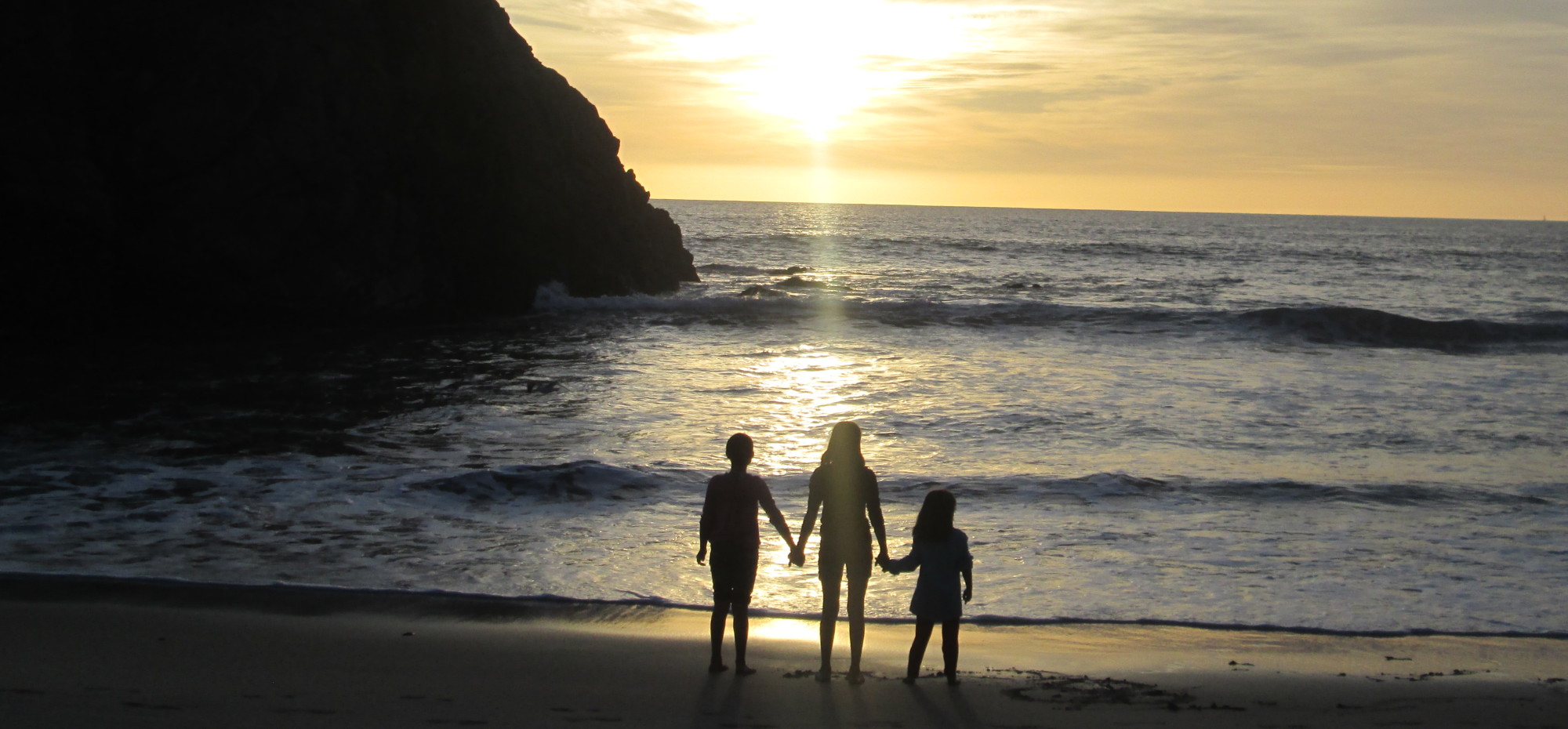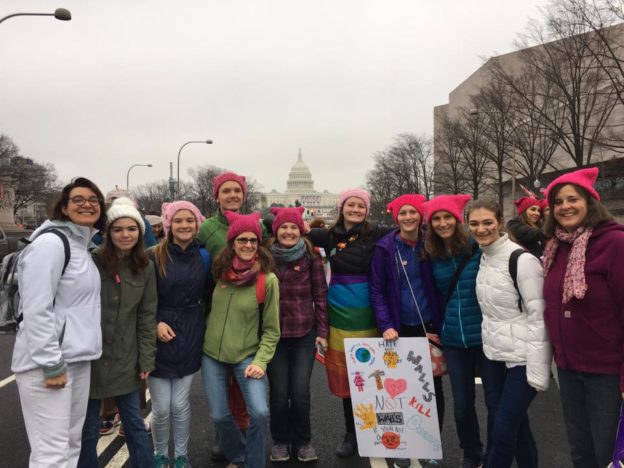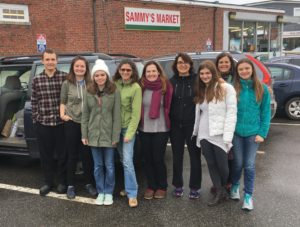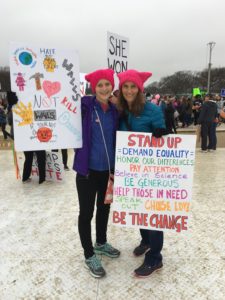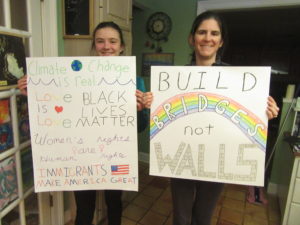 Sometimes democracy looks like a long line of people waiting for an overflowing porta-potty.
Sometimes democracy looks like a long line of people waiting for an overflowing porta-potty.
When we went to vote on November 8 (yes, Mr. President, we did in fact vote), my husband and I dragged our daughters out of bed and to the polls with us. We even pulled them into the voting booth. We told them they were witnessing history as we filled in the oval for our first female president.
Like much of the country, we were stunned and crushed as the results rolled in. Not because a woman lost. But because the man who won was an openly racist, sexist bully. A man whose main goal in life, besides enriching himself, was seemingly to find people who had so very little, and convince them that their enemy was others who had even less. A man whose go-to response for any provocation, however, slight, was to behave in a way that most of us wouldn’t have tolerated in our toddlers. The people telling us to give him a chance had missed the point. Regardless of his future actions, the fact that a person could be elected in spite of this behavior — or, worse yet, because of it — made us realize we didn’t live in the kind of world that we’d thought we had.
So we decided to march, and witness a different kind of history. To show the world, and ourselves, and our children, that we are not alone, but part of an army.
It wasn’t the easiest trip. We drove late into the night through remote parts of Pennsylvania (having chosen an alternate longer route to avoid traffic in the major cities on the coast). It was raining and foggy, and everything was complicated by trying to drive two minivans in caravan. After arrival, Wendy and I had to go out again to attempt to secure Metro cards. We are two of the most directionally-challenged people on the planet, and Wendy’s cell phone that provided navigation was about to die, and the first station we went to had no clear place to park and then turned out to be closed. By the time we got back (victorious!) it was near to 1am.
We shouldn’t complain, though, because our friend Tyra and her daughter Riley had to take a 12-hour bus ride up from Georgia. The bus left an hour and a half late, and then they had to catch the Metro from DC to Bethesda, and then they WALKED a mile and a half, at midnight, carrying all their stuff, to the house.
But these are not the things we’ll remember. By now just about everyone has heard what the march was like — the crowds, the love and solidarity, the energy and inspiring speeches and funny signs. So here are a few other things that will stay with me.
It’s the bond with my long-time mom friends — Wendy, Judy, Tyra, and Susan. We realized that we’d all met in a class about sustainable parenting back when our kids were babies and toddlers. How great it is that we’re all still working together for the same cause, more than 10 years later, and that some of those same kids are now engaged young adults who are marching by our sides.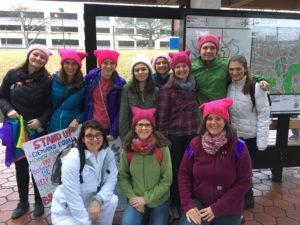
And those same kids, who were up past midnight, and smiling and ready to go by 7am. They stood in crowds and cold through several hours of speeches, with nothing but granola bars to sustain them, all without a word of complaint.
It’s Wendy’s eighteen-year-old son Sam, who voted for the first time this year — and chose to give up his weekend to join a group of ten women and girls, marching through DC in his pink hat and being helpful to everyone. And his friend Haley, who jumped in a van with a bunch of people she’d never met because she wanted so much to make her voice heard.
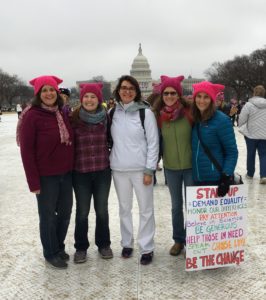 It’s those who made the trip possible even though they didn’t attend themselves. My generous friend Kathleen and her family, who opened their lovely home to a bunch of people who were mostly strangers. Our friend Heather, who made us hats. Our husbands, who held down the fort at home and welcomed us warmly on our return.
It’s those who made the trip possible even though they didn’t attend themselves. My generous friend Kathleen and her family, who opened their lovely home to a bunch of people who were mostly strangers. Our friend Heather, who made us hats. Our husbands, who held down the fort at home and welcomed us warmly on our return.
It’s the woman working in the Grosvenor metro station the night before the march. She’d probably had a very long day, dealing with scores of out-of-towners who didn’t know what they were doing. She can’t have been too excited to see two people jump out of a car with NH license plates past midnight and run toward the ticket machine, with confused expressions and several half-used Metro cards clutched in our hands. But she greeted us with a smile and walked us through our lengthy transaction with cheerfulness and patience. And then she turned around and did the same thing for the two people who rushed in five minutes after we did.
It’s her co-workers who were on duty the night of the march, greeting train after crowded train with claps and shouts of “thank you!” as throngs of marchers streamed out onto the platform.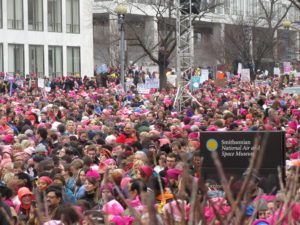
It’s the other marchers on that train, which was the most crowded place I’ve ever been in my life. Instead of glaring and grumbling, people chatted and helped each other. When someone left the train, the entire car gave them a big cheer like they were a rock star leaving the stage after a concert.
And the woman restocking the restroom in a highway rest area the day after the march. The whole rest area was overwhelmed with marchers, and probably had been since early that morning. She undoubtedly had had a tough day — but she smiled and chatted and cheered with the long line of women waiting for an open stall.
Even those crowds and long lines, in the streets and in the subway and at the rest stop. Those things meant that the march was a tremendous success, and that was more important than a little delay or discomfort.
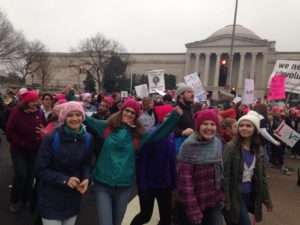 And most of all: it’s the fact that it was totally unspoiled by conflict.
And most of all: it’s the fact that it was totally unspoiled by conflict.
Think about that. Over half a million people crammed into a few city blocks. Women and men, eighty-year-olds and college students, rich and poor, black and brown and white, gay and straight, urbanites and farmers — all wedged together in a giant mass of humanity. We were sleep-deprived and travel-weary, hungry and cold, footsore, dehydrated and desperately needing to pee. And yet there was not a single violent incident or arrest.
Instead, there were people looking out for each other. Yelling back to the people behind them to tell them a step was approaching. Climbing a tree so as to direct people around a low fence that was impeding progress to the street. Supporting those who stumbled and helping those who needed a leg up. Swapping stories and smiles and Metro maps. And knowing without a doubt that they will not be fighting alone.
